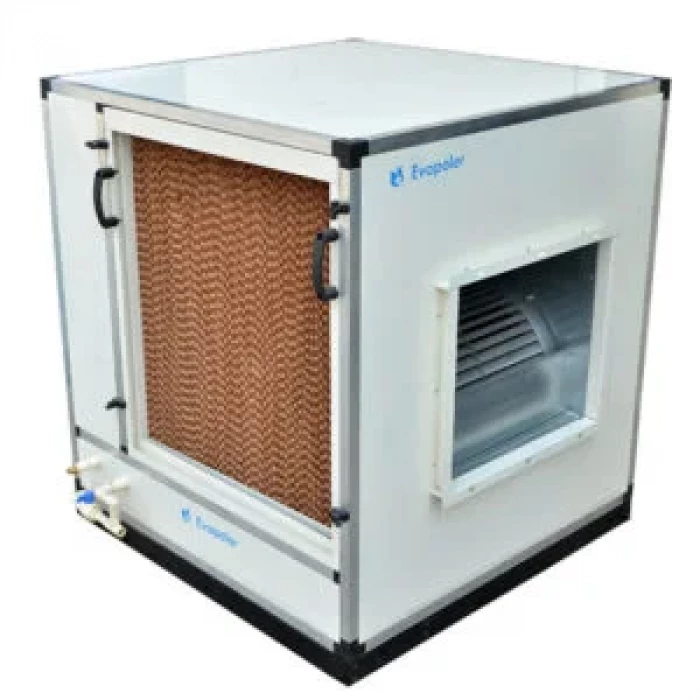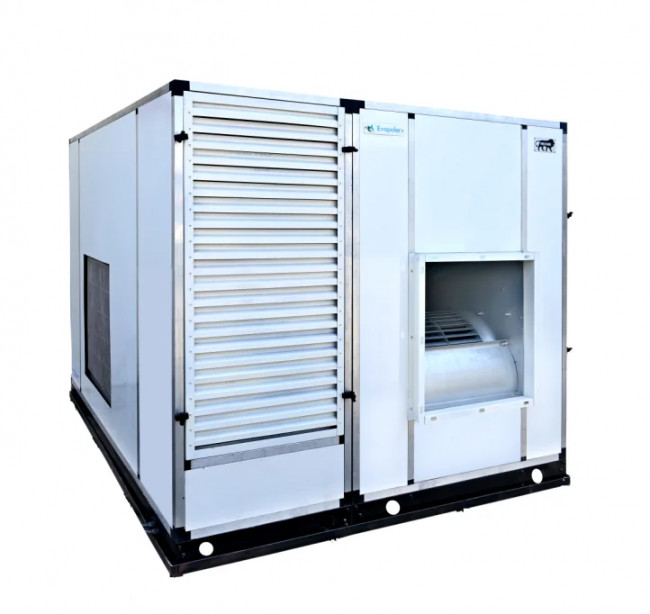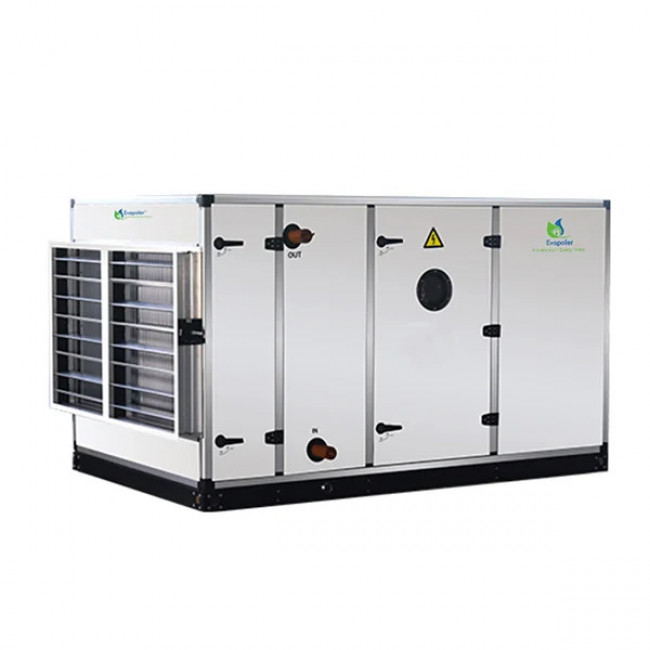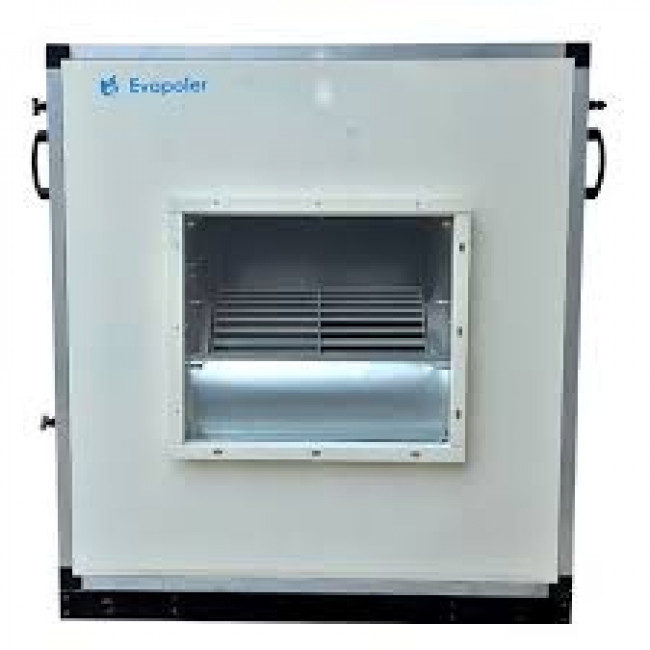Industrial air coolers and evaporative air coolers are two types of cooling systems that use the process of evaporation to cool the air. While they share some similarities, such as their reliance on water evaporation for cooling, there are several key differences between them. In this blog, we will explore the distinctions between industrial air coolers and evaporative air coolers.

Industrial Air Coolers
Industrial air coolers, also known as commercial air coolers or swamp coolers, are designed for large-scale cooling applications in industrial settings, warehouses, factories, and outdoor spaces. These coolers are built to handle high airflow volumes and are often used to cool down large areas efficiently.
Key Features of Industrial Air Coolers:
High Capacity: Industrial air coolers have a high cooling capacity, allowing them to lower the temperature in large spaces effectively.
Powerful Fans: These coolers are equipped with powerful fans that can move a significant amount of air, ensuring even distribution of cooled air throughout the space.
Durable Construction: Due to their use in industrial environments, these coolers are built with durable materials to withstand harsh conditions and frequent use.
Variable Speed Settings: Many industrial air coolers come with variable speed settings, allowing users to adjust the airflow and cooling intensity as needed.
Remote Control and Timer: Some models of industrial air coolers offer remote control functionality and timers, providing convenience and energy savings.
Evaporative Air Coolers
Evaporative air coolers, also known as swamp coolers or desert coolers, are designed for residential and small commercial cooling purposes. These coolers are more compact than industrial air coolers and are suitable for cooling individual rooms or smaller areas.
Key Features of Evaporative Air Coolers:
Portable Design: Evaporative air coolers are typically portable and can be moved from one room to another, making them ideal for residential use.
Energy Efficiency: Compared to traditional air conditioning systems, evaporative air coolers consume less energy, resulting in lower electricity bills.
Environmentally Friendly: These coolers use water evaporation as the primary cooling mechanism, making them environmentally friendly and reducing carbon emissions.
Humidification: Evaporative air coolers also act as humidifiers, adding moisture to the air, which can be beneficial in dry climates or during hot weather.
Affordability: Evaporative air coolers are generally more affordable to purchase and operate than air conditioners, making them a cost-effective cooling solution.
Differences Between Industrial Air Coolers and Evaporative Air Coolers
Size and Capacity: Industrial air coolers are larger and have a higher cooling capacity compared to evaporative air coolers, which are smaller and suitable for smaller spaces.
Intended Use: Industrial air coolers are designed for industrial and commercial applications, while evaporative air coolers are typically used in residential settings.
Cooling Efficiency: Due to their size and power, industrial air coolers are more effective at cooling large areas, whereas evaporative air coolers are ideal for individual rooms or small spaces.
Portability: Evaporative air coolers are more portable and easier to move around, while industrial air coolers are usually stationary and designed for fixed installations.
Cost: Industrial air coolers are generally more expensive than evaporative air coolers, both in terms of initial purchase cost and operational expenses.
In conclusion, industrial air coolers and evaporative air coolers serve different purposes and are suited for different cooling needs. Industrial air coolers are suitable for large-scale cooling in industrial settings, while evaporative air coolers are more suitable for residential and small commercial applications. Understanding the differences between these two types of coolers can help individuals and businesses choose the right cooling solution for their specific requirements.
Evaporative air coolers, also known as swamp coolers or desert coolers, play a crucial role in industrial settings despite their common association with residential cooling. These cooling systems offer several advantages that make them valuable assets in industrial environments, where temperature control is essential for worker comfort, equipment efficiency, and overall productivity. In this article, we will delve into why evaporative air coolers are needed for industrial applications, exploring their benefits, functionalities, and cost-effectiveness.
Efficient Cooling Performance
One of the primary reasons why evaporative air coolers are needed in industrial settings is their efficient cooling performance. These coolers use the natural process of evaporation to cool the air, drawing in warm air from the environment and passing it through wet cooling pads. As the air passes through the pads, it loses heat through evaporation, resulting in a cooler and more comfortable indoor environment.
In industrial facilities, maintaining a comfortable temperature is crucial for worker well-being and productivity. High temperatures can lead to discomfort, fatigue, and decreased focus, ultimately affecting employee morale and performance. Evaporative air coolers help mitigate these issues by providing a consistent and cool airflow, creating a conducive working environment even in hot climates or during summer months.
Cost-Effective Cooling Solution
Another compelling reason for the use of evaporative air coolers in industrial settings is their cost-effectiveness. Compared to traditional air conditioning systems, which rely on refrigeration and compressor-based cooling, evaporative coolers are much more energy-efficient and affordable to operate.
Industrial facilities often have large indoor spaces that require significant cooling capacity. Using traditional air conditioning units to cool such areas can result in high energy bills and operational costs. Evaporative air coolers offer a cost-effective alternative, consuming significantly less electricity while providing efficient cooling performance. This cost savings can translate into substantial benefits for industrial businesses, especially those operating on tight budgets or seeking to reduce overhead expenses.
Environmental Sustainability
Environmental sustainability is an increasingly important consideration for industries across the globe. Evaporative air coolers align well with sustainability goals due to their environmentally friendly operation. Unlike refrigerant-based air conditioning systems that rely on chemicals and gases with potential environmental impacts, evaporative coolers use water as their primary cooling medium.
Water evaporation is a natural process that does not release harmful pollutants or contribute to greenhouse gas emissions. Additionally, evaporative air coolers do not deplete ozone or contribute to global warming, making them a more eco-conscious choice for industrial cooling applications. As businesses strive to adopt sustainable practices and reduce their carbon footprint, the use of evaporative air coolers can contribute positively to their environmental initiatives.
Flexibility and Adaptability
Evaporative air coolers offer flexibility and adaptability, making them suitable for a wide range of industrial environments and applications. These coolers come in various sizes and configurations, allowing businesses to choose models that meet their specific cooling needs. Whether cooling large warehouses, manufacturing facilities, or outdoor work areas, evaporative air coolers can be customized to provide optimal cooling performance.
Moreover, evaporative coolers can be integrated with existing HVAC systems or used as standalone units, providing versatility in installation and usage. Their portability and ease of maintenance further enhance their suitability for industrial settings, where flexibility and adaptability are key factors in ensuring efficient cooling operations.
Conclusion
In conclusion, evaporative air coolers are indispensable in industrial settings due to their efficient cooling performance, cost-effectiveness, environmental sustainability, and flexibility. These cooling systems play a crucial role in maintaining comfortable working conditions, improving productivity, and reducing energy expenses for industrial businesses. As industries prioritize energy efficiency, sustainability, and operational excellence, the adoption of evaporative air coolers continues to grow as a strategic cooling solution that delivers tangible benefits across various industrial applications.













